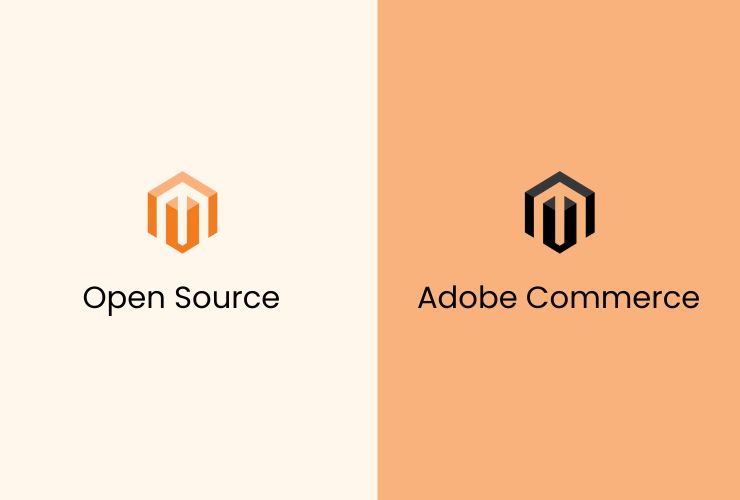When designing an eCommerce website on Magento, one of the strategic considerations of great importance is whether to opt for Magento Open Source or Adobe Commerce. Both editions share a common core and have originated from the same platform but differ widely in their features, capabilities, and uses in business.
Whether it’s launching your first store or building out an existing brand, understanding the technical requirements, customer experience requirements, and long-term business goals is key to making the right decision.
1. Magento Open Source: A Versatile Platform for Emerging Brands
Magento Open Source is a community-supported, open-source edition that offers merchants and developers a solid foundation on which to develop and establish a customized eCommerce experience. Its modularity renders it an ideal solution for small and medium-sized businesses that seek to have total control over the appearance as well as functionality of the site.
Who Should Use Magento Open Source?
Startups and Small Businesses
Magento Open Source is budget-friendly and ideal for beginners or if you have a limited budget.
Tech-Savvy Teams
If you have an in-house development team or a trusted agency partner, Open Source gives you the freedom to tailor the platform as you need to.
Brands That Prioritize Customization
From checkout workflows to themes, everything can be tuned without being bound by enterprise agreements.
Key Features:
- Full product catalog and inventory management
- Mobile-friendly themes for contemporary user experience
- Streamlined checkout and payment gateway support through multiple options
- SEO integrated features (meta tags, custom URLs, etc.)
- Multi-currency and multilingual capabilities for global selling
- Open-source community for modules, discussion forums, and complimentary support
Although the platform itself is cost-free, there will still be costs incurred for hosting, security, custom code development, and third-party integrations. It’s also your responsibility to keep your site updated and secure, possibly through additional resources or technical expertise.
2. Adobe Commerce: Enterprise-Class Power and Performance
Adobe Commerce, formerly Magento Commerce, is the high-end, fully supported, and cloud-optimized version of Magento. It was created for enterprises and high-growth companies that require more out-of-the-box capabilities, scalability, and advanced personalization.
It brings Adobe’s powerful marketing and analytics capabilities together with Magento’s powerful commerce engine to deliver an end-to-end platform that drives engagement, conversion, and long-term growth.
Who Should Choose Adobe Commerce?
Established Enterprises
Adobe Commerce is built for high-volume commerce, multiple sites, and global commerce.
B2B Businesses
Its B2B integrated suite provides features like quote management, shared catalogs, and corporate account hierarchies.
Brands Focused on Experience & Automation
Integrated AI tools and visual merchandising make it easy to deliver dynamic, personalized content.
Advanced Features:
- AI-powered product recommendations using Adobe Sensei
- Improved segmentation, loyalty programs, and promotion rules
- Robust page builder for drag-and-drop content creation
- Business intelligence dashboards and analytics
- Cloud infrastructure with performance optimization capabilities
- Incorporated B2B capabilities (negotiated price, bespoke catalogs)
- 24/7 specialized Adobe technical support
- Regular security patches, updates, and SLA-supported performance
- Adobe Commerce reduces the need for custom development with many features out of the box. This convenience comes at a cost, with
- licenses based on your company revenue.
3. Magento Open Source vs. Adobe Commerce: Feature Comparison
| Feature | Magento Open Source | Adobe Commerce |
|---|---|---|
| License Cost | Free | Paid (Based on annual revenue) |
| Hosting | Self-hosted | Adobe Commerce Cloud or on-prem |
| Customization | Full access | Full access |
| B2B Features | Minimal (via extensions) | Built-in |
| AI & Personalization | Not included | Adobe Sensei built-in |
| Visual Page Builder | Not included | Included |
| Multi-Source Inventory | Basic | Advanced, with automation |
| Support | Community | Adobe support + SLAs |
| Performance Optimization | Developer-driven | Built-in tools |
| Reporting & Analytics | Limited | Advanced BI & reporting tools |
4. The Right Choice for Your Business
Of the two, the choice is yours, depending on your budget, technical proficiency, business size, and feature needs.
Select Magento Open Source if:
- You are opening a new online store and do not want to pay upfront software license costs
- You have in-house or agency development resources
- You want open-ended customization and flexibility
- Your store does not need advanced marketing automation or B2B workflow—yet
Select Adobe Commerce if
- You’re an enterprise or high-growth business seeking enterprise-grade capabilities
- You require advanced tools to manage content, customer engagement, and operations at scale
- You’re running a B2B operation and need built-in B2B tools like quotes, company accounts, and shared catalogs
- You value dedicated support, performance monitoring, and cloud scalability without managing infrastructure
5. Real-World Scenarios: A Quick Guide
- A local fashion brand building its first online store with limited budget → Magento Open Source
- A world-renowned electronics brand with multiple physical storefronts and an extensive product catalog → Adobe Commerce
- A specialty B2B distributor in search of price segmentation and bulk order management → Adobe Commerce
- A boutique design studio with internal developers and a heavy emphasis on user experience → Magento Open Source
Conclusion: Which Magento Platform Fits Your Vision
The platform you implement today will significantly influence your store’s performance, cost profile, scalability, and growth strategy overall. While Magento Open Source provides unrestricted freedom and cost savings, Adobe Commerce provides the depth, reliability, and support the enterprise eCommerce requires.
Think beyond features—think about your long-term vision, the potential of your team, the infrastructure you’ll require, and your customer engagement strategy. Magento provides you with the ability to scale, but the version you use will determine the rate at which and how well you do it.
Whether you start small or think big, Magento allows your eCommerce business to be powered by a platform that scales with yours.
Contact Us Today













 Database Development
Database Development












































